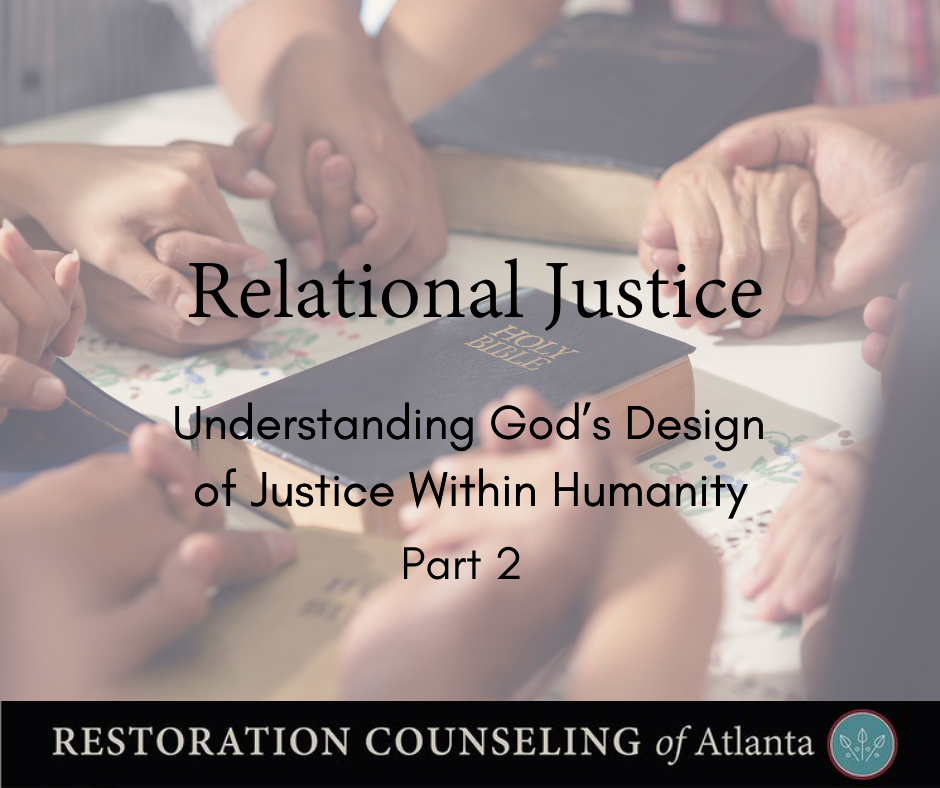Understanding God’s Design of Justice Within Humanity – Part 2
This article is a continuation of my previous article Relational Justice. It includes additional spiritual, foundational virtues to complete what it means to be a relationally just and virtuous person. If you have not read the first part of this article, I recommend reading it before continuing.
Being a Good Person
Reiterating Plato’s outline of the cardinal or key virtues, he describes these four virtues as essential to being a good person [1]:
- Prudence – the mother of all virtues—the perfected ability to decide what is good (wisdom)
- Justice – the virtue that regulates all relationships—knowing what is good by giving every person their due rights (prudence in action, so we can live in harmony and peace)
- Temperance – not giving one’s self over to excess (self-control)
- Fortitude – the willingness to risk suffering. This is the virtue that protects the four virtues by empowering ooneselfto put the virtues into action (courage).
“In the Protagoras, Socrates holds that ‘whoever learns what is good and what is bad will never be swayed by anything to act otherwise than as knowledge (episteme) bids, and that intelligence (phronesis) is a sufficient succor for mankind” (352c4-8). It follows, then, that failures of human beings are always a matter of ignorance.'” [2] Socrates and Plato’s philosophies ultimately mislead. Thomas Aquinas, an early Christian philosopher, clarifies that their philosophies do not account for sin. The nature of sin that is now integrated within us, turns the focus from God being Lord to us being god and trying to ultimately control.
Our Desire to Control
Sin creates egocentrism or a compulsion to be selfish and self-preserving. Because of this, we have an urge to be more important and “climb” over others to be seen, appreciated, and worshipped. Therefore, we can be prudent, just, temperant, and fortuitous, and at the same time be egocentric and boastful. As a result, we think we are better than others because we are being virtuous. This, in turn, invalidates attempts to be virtuous, similar to being humble and striving to be seen by others as humble, which contradicts humility.
God creates the mandate to guard our hearts (Prov. 4:23) by acknowledging, processing, and orienting our emotions and thoughts to reality. However, we cannot ultimately get rid of our sin and selfish urges (John 15:5), despite how hard we try to “clean” ourselves and stay on our side of the street. So what are we to do with this war within us as we try to own ourselves and our selfishness then?
So what should we do with this battle within us?
As we try to own ourselves and combat our selfishness, we are to ask God to grant us Himself and His supernatural virtues.
To be relationally just we must do justly (see my previous article), love mercy (habitual grace), and walk humbly with God (walk “. . . means to live conscious of him at all times. It is to be both ‘wholly exposed [and accountable] but wholly befriended [and loved].'” [3]). To do these things, we must ask for God’s supernatural virtues which are accumulated to faith, hope, and love.
“According to Aquinas, this grace, through the theological virtues, allows humanity to become agents in meritorious action that is beyond their natural ability. In this way, it is supernatural.” [4] In other words, it is not our merit or our will, but God’s nature flowing through our mind, emotions, soul, spirit, etc. (Eph. 2:8, Isa. 55:8, Rom. 8:1-39). God’s supernatural virtues are beyond us. We cannot “do” more faith, hope, and love, but we can invite and receive His nature as a gift, and let His faith, hope, and love flow through us.
The Nature of God’s Supernatural Virtues
Faith is a virtue not just because it is “assurance of things hoped for and conviction of things that are not seen” (Heb. 11:1). Instead, it is continually being open and humble to trust the ultimacy and truth of God and His integrity and not ours.[5]
Hope is the anticipation and expectation of God promising to be a good, just God. It is to believe that He is infallible, true, and integrous. A helpful acronym is “hold on pain ends” (H.O.P.E.). Thus, we see that it will end and is ending, and we have daily access to restoration and peace through Him. (2 Thess. 2:16, Rom. 12:12, Rom. 15:13).[6]
Love
The love referred to in 1 Corinthians 13:1 is agape love. This love is unconditional, unhuman love that transforms us to see, hear, feel, and know the innate goodness of God that is created with us and others.[7] Love is the virtue that fulfills the other supernatural virtues of faith and hope (1 Thess. 1:3, 1 Cor. 13:1-3).
God gives these supernatural virtues in our vertical relationship with Him, and He designed these virtues to be reflected horizontally to each other in relationships. Love is the ultimate energy that helps carry out faith and hope, given that our sinful nature can hinder faith. Fear can diminish hope as well, as hope “that is completed is not hope anymore” (Rom. 8: 24). But love is the energy that endures, allowing us to obtain complete faith and hope (1 Cor. 13:7).
Asking God Daily
We must ask for His gifts of faith, hope, and love to be able to live life prudently, justly, temperately, and fortuitously in the midst of our uncomfortable, fearful, and sinful nature. Other ways to live life well include asking God for the gifts of wisdom, knowledge, discernment of the Holy Spirit in the midst of other spirits, interpretation of tongues, speaking in tongues, healing, the performing of miracles, prophecy, courage, and reverence of God (Isa. 12:1-2, 1 Cor. 12).
A helpful prayer that I invite you to pray, not to simply “say the magic words and be blessed”, but more so to notice your heart as you pray is as follows:
Father, I ask to be attuned to you and your Spirit as you flow within me today. Renew my mind, emotions, and heart to be oriented and regulated, and see what you have in store for me today. Unharness anything that keeps me from being with you, myself, and others. Help me to see you, know you more, and love you as well as help me see me, love me, and take care of my heart as you do. Guide me to be a person of integrity and fulfill my responsibilities, as well as carry out your will. Help me to be with you as you move continually in me and around me.
Father, I pray for the gift of faith—to believe in who you say you are (that you are good, you are just and faithful, you have my best interest in mind, you’ve got me and are secure) and who you say I am (I am intrinsically good, I am intrinsically worthy of your love, and I am approved by you). The gift of hope—that you have won, it is all in your hands, and that you are continually redeeming pain and instilling peace. And the gift of love—help me to receive you pursuing and choosing me. Help me receive and feel your love knowing that you fight for me relentlessly, and to reflect your love to others.
I pray for your gifts of knowledge, wisdom, discernment of the Holy Spirit in the midst of other spirits, interpretation of tongues, speaking in tongues, healing, the performing of miracles, prophecy, courage, and reverence of you. Help me to not replace your approval, validation, fulfillment, and wanting of me with others but look to you to receive you and your heart for me continually.
Father, help me to want what I already have and grow in my relationship with you, myself, and others. I take my place at your throne. Help me to carry out your kingdom and will for my life as well as be responsible for what you have given me. Grant me the serenity to accept the things I cannot change, the courage to change the things I can, and the wisdom to know the difference. Help me own myself and my stuff and not own others and their stuff.
Help me to forgive myself for beating, shaming, and condemning myself when you don’t. Help me to forgive those who have hurt and harmed me. Show me how to reconcile with those I have hurt and harmed. I ask for eyes to see what you see, ears to hear what you hear, words to say what you want me to say, and a heart to feel what you feel.
Thank you for taking my place and dying for me because you love me and desire me. I ask you to unharness anything that keeps me from receiving and being with you, myself, and others. And I ask you to bind Satan, his followers, and any evil against me. In Jesus’s name I pray, amen.

Written by:
Micah Mabe, MA MFT, APC
Roswell Location
micah@restorationcounselingatl.com, ext. 158
Micah comes from a Christian background and enjoys working with adolescents and families and couples. His focus is coming alongside families, adolescents, and teenagers who desire help and resolution. His other focus is helping couples who want to understand better and love their partner to enhance their marriage. He also helps couples in conflictual relationships struggling with disconnection and isolation.
[1] Aristotle, Ross, W. D., & Urmson, J. O. (1980). The Nicomachean ethics. Oxford (Oxfordshire: Oxford University Press.
[2] Krasovec, J. (2000). Plato’s and Plutarch’s Theories of Punishment. In Reward, punishment, and forgiveness: The thinking and beliefs of ancient Israel in the light of Greek and modern views (p. 716). essay, E. J. Brill.
[3] Kathy, K. T. K. (2015). October 25: A Thankful Life. In The Songs of Jesus: A year of daily devotions in the psalms. essay, Penguin Group USA.
[4] Wikimedia Foundation. (2022, January 14). Theological virtues. Wikipedia. Retrieved January 22, 2022, from https://en.wikipedia.org/wiki/Theological_virtues
[5] Wikimedia Foundation. (2022, January 14). Theological virtues. Wikipedia. Retrieved January 22, 2022, from https://en.wikipedia.org/wiki/Theological_virtues#cite_note-Pope-7
[6] G1680 – elpis – Strong’s Greek Lexicon (niv). Retrieved from https://www.blueletterbible.org/lexicon/g1680/niv/mgnt/0-1/
[7] G26 – agapē – Strong’s Greek Lexicon (niv). Retrieved from https://www.blueletterbible.org/lexicon/g26/niv/mgnt/0-1/

